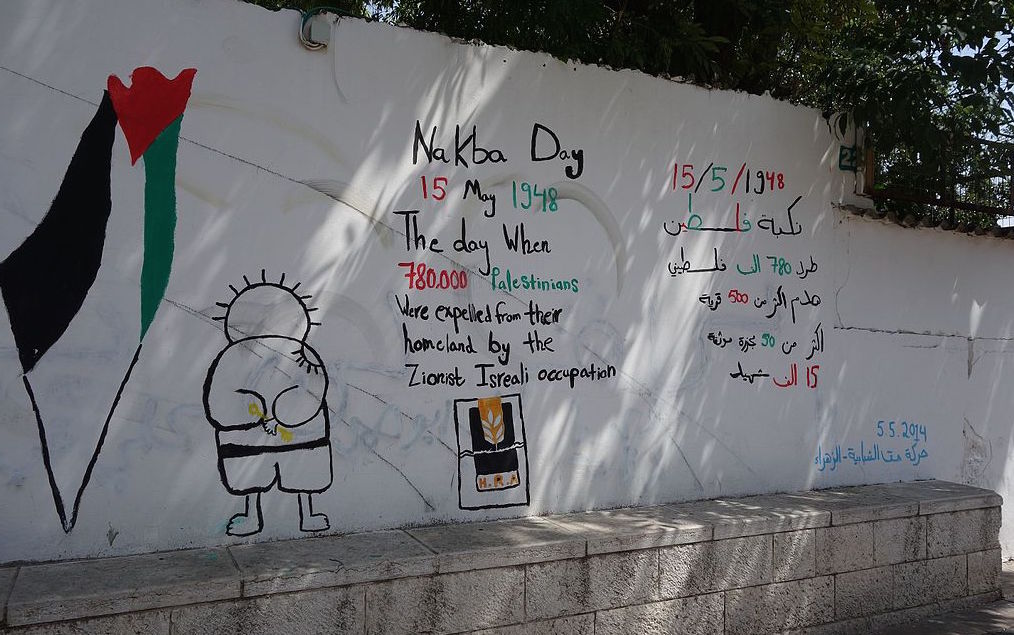Around the world, every May 15 is commemorated as Nakba Day. In 1948, during the 12 or so months known to Palestinians as the “Nakba” (Arabic for “catastrophe”), an estimated 750,000 people were ethnically cleansed from their homes and land, and more than 600 villages destroyed. This was the “cost” of creating the State of Israel, paid by the indigenous people of Palestine. Few people suspected then and not many realize today that the events of that year would help steamroll future developments into the full-blown catastrophe facing the world 71 years later.
The planet we call home is in dire trouble. Humanity’s ability to survive global warming depends on strong and determined global action by every single nation. States act according to international law and work within world governing structures. Both of these have been paralyzed, almost mortally wounded, by decades of Israel’s impunity towards Palestinians and occupation of their land — all in open violation of international norms.
What might appear as overstating the importance of 1948 needs to be understood as an event that has overshadowed the global agenda. It has been the simmering conflict which has tainted 70 years of the world’s evolution and interfered with the resolution of many of its problems.
The Nakba and the resulting creation of Israel in May 1948 did not create global warming but the pair did contribute immeasurably to the ongoing toxic political climate which polarized the world and moved us inexorably to this outcome. The Israel-Palestine problem like no other has undermined the practice of international law and severely damaged the credibility of the United Nations. That such a small part of the Earth, tinier than a fingernail on the human body, can incapacitate the proper functioning of the world body is a testament to the power of the Zionist agenda and the lack of world leadership required to overcome it in order to reach a world-saving commitment.
In the last 70 years, Israel, with the blessings of its friends and allies in world power centres (including Canada), has doggedly pursued its settler colonialist project to further advance the gains of 1948 at the expense of the Palestinians. However, there are other costs which few may be aware of. These are hidden costs, much like “externalities” or unaccounted costs (e.g. water, air, waste disposal), which mask the true investment and help doom the physical environment.
In the affairs of nations these hidden externalities are international law and world governance — and every person on Earth pays dearly. The most effective way to cement injustices involving colonization of occupied lands, entrenching apartheid laws and refusing to resolve the world’s longest refugee crisis is to neuter international law and to flout the United Nations. Of course, Israel could not do this alone without the complicity of powerful nations, such as the U.S., but also Canada.
On this anniversary, the world is an ever-darkening place. The shadow of the anticipated “deal of the century” for Israel-Palestine promised by Trump and his coterie only guarantees a terrible status quo for Palestinians and nothing remotely like a resolution. Coupled with the increasing bellicose threats to Iran (viewed by Israel as its main enemy and therefore America’s enemy) we can only expect more of the same in a disastrous Middle East and even less progress towards resolving global warming.
To save human life on the planet we must rescue international law and global governance from impotence and irrelevance. Insisting on applying international law fairly and fully, and putting an end to coddling and protecting Israel’s actions in world forums, will bring back leadership and moral authority to set a healthy agenda for the planet.
The best place to begin to help the world is a true and just peace in Israel-Palestine and the only way to do that is to address the core injustice of the Nakba in 1948.
To learn more about the Nakba, visit this resource page. For details of the Nakba Day events across Canada, please visit this link.
Robert Massoud ran the much-missed, activist meeting space and independent community gallery, Beit Zatoun located in the Toronto-iconic Mirvish Village before it was demolished to advance Toronto real estate.
Photo: PRA/Wikimedia Commons
Help make rabble sustainable. Please consider supporting our work with a monthly donation. Support rabble.ca today for as little as $1 per month!




